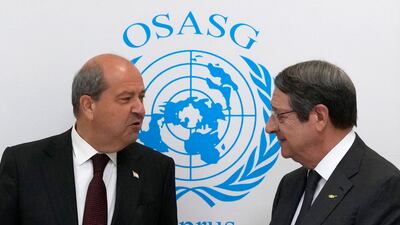President Nicos Anastasiades of Cyprus wants world leaders to reactivate peace talks on the divided Mediterranean country, suggesting it could provide a solution to help ease Europe’s energy crisis.
The Cypriot leader said the war in Ukraine and global concerns over Russian gas supplies added urgency to resolving the long-standing fissure in his country as that could, in turn, provide the EU with alternative gas supplies.
“It is now even more urgent to see an initiative from the EU and the UN but also from the United States, which says it would like to see Turkey involved in the Mediterranean,” said Mr Anastasiades.
“I have the impression that the Ukrainian crisis is an opportunity for Europe, the Americans, but also the United Nations to create conditions for resolving outstanding problems related to the causes of the Ukrainian war.”
The Eastern Mediterranean has the potential to partially offset Europe's energy needs, even if experts are less confident that the EastMed pipeline could offer relief in the current energy crisis. He said the EU’s search for alternative energy sources to Russian gas were available in the Levantine basin and the Eastern Mediterranean.
Mr Anastasiades had planned to propose a restarting of talks during the March European Council but held off due to the war in Ukraine.
Nevertheless, he said he told US Undersecretary of State Victoria Nuland that he hoped the EU, the US and the UN would come up with a new Cyprus initiative after she visited the island earlier this month.
Cyprus has been divided in two — a Greek-Cypriot controlled southern part and a Turkish-Cypriot administered northern part only recognised by Ankara — since 1974, when Turkey invaded the island following an attempted Greece-backed coup.
The internationally recognised Republic of Cyprus is seeking a reunification of the island under a federal state system but the Turkish Republic of Northern Cyprus insists on a two-state solution.
Mr Anastasides said he thought that Turkey’s relations with the EU would improve when a long-lasting solution to the Cyprus problem was found. However, the Cypriot leader is unhappy that Turkey does not intend to engage in any peace initiatives until after the country’s elections take place in 2023.
Would an East-Med pipeline be a viable gas supplier to Europe?
As the EU looks to reduce its reliance on Russian gas, there has been renewed interest in the gas reserves available in the Levantine basin and the Eastern Mediterranean.
In 2009, immense reserves of natural gas — up to 381 trillion cubic feet of gas, or about 5 per cent of the world’s gas reserves — were discovered off the Eastern Mediterranean Levant Basin.
However, the region lacks significant oil and gas infrastructure and political relations between the countries involved — Cyprus, Turkey, Greece, Egypt, Israel, Lebanon and Syria — are strained on a number of fronts.

The East-Med Pipeline, a proposed 2,000-kilometre pipeline — 1,609km of which would be undersea — linking the Levantine Basin to Europe was first suggested in 2012, but continuing geopolitical tensions coupled with environmental concerns have stalled its progress.
Israel has been trying to enlist several European countries in the construction of the pipeline at a cost of $7 billion.
While former US president Donald Trump supported the East-Med Pipeline project, the current administration of President Joe Biden has not, freezing the effort after expressing reservations about the pipeline's environmental impact and economic feasibility.
The pipeline would potentially be able to carry between 9 and 12 billion cubic metres of gas each year from the Levantine Basin offshore gas reserves to Cyprus, the Greek island of Crete and the Greek mainland.
The proposed pipeline is tied to long-running tensions between Cyprus, Greece and Turkey over maritime borders and exploration for offshore oil and gas.
Turkey angered the EU when it began drilling for gas around Cyprus in areas it claims belong to either Turkish Cypriots or Turkey’s continental shelf.
Earlier this month, officials from Israel, Greece and Cyprus met in Athens to deepen their energy co-operation on gas pipeline projects, while Lebanon’s top diplomats visited the island to express readiness to work with Cyprus to exploit potential gas deposits in waters between the two Eastern Mediterranean countries.
While a Cyprus solution is seen as a necessary prerequisite to the development of the East-Med pipeline, resolving the long-standing conflicts and land disputes between Israel and its neighbours, Lebanon and Syria, are also vital.


